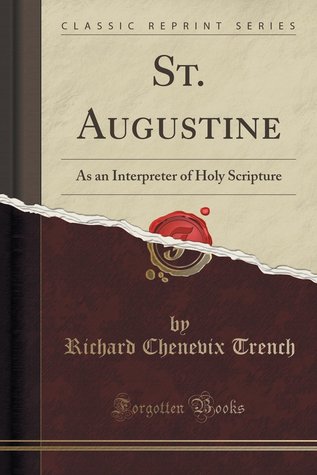- Bible
- Read the Bible
- Bible Versions
- Verse of the Day
- Reading Plans
- Verses by Topic
- Books of the Bible
- Bible Images
- Study
- Commentaries
- Concordances
- Dictionaries
- Encyclopedias
- Sermons
- Bible Atlas & Maps
- BP Wiki
- Devotionals
- Today's Devotionals
- Light of the World
- All Devotionals
- Inspirational Quotes
- More
- Picture Quotes
- Videos
- Inspirational
- Bible Study
- What The Bible Says
- Bible Q&As
- Daily Bread
- Bible by Genre
- Bible Stories
- Random Bible Verse
- Community
- Store
St. Augustine: As an Interpreter of Holy Scripture (Classic Reprint)
by Richard Chenevix Trench
Excerpt from St. Augustine: As an Interpreter of Holy Scripture
A Preliminary chapter which I intended to prefix to a second edition of an Exposition of the Sermon on the Mount, drawn from the Writings of St. Augustine, of which the first edition has been for some time out of print, little by little has grown into many chapters. It still occupies the place for which it was originally intended, as an introduction to that volume; but I have also published it by itself, in case any might desire to possess it, who would care less for the book to which it is prefixed, or who, already possessing that, ought not to be obliged, for the obtaining of this, to purchase that over again.
About the Publisher
Forgotten Books publishes hundreds of thousands of rare and classic books. Find more at www.forgottenbooks.comwww.forgottenbooks.com
This book is a reproduction of an important historical work. Forgotten Books uses state-of-the-art technology to digitally reconstruct the work, preserving the original format whilst repairing imperfections present in the aged copy. In rare cases, an imperfection in the original, such as a blemish or missing page, may be replicated in our edition. We do, however, repair the vast majority of imperfections successfully; any imperfections that remain are intentionally left to preserve the state of such historical works.
A Preliminary chapter which I intended to prefix to a second edition of an Exposition of the Sermon on the Mount, drawn from the Writings of St. Augustine, of which the first edition has been for some time out of print, little by little has grown into many chapters. It still occupies the place for which it was originally intended, as an introduction to that volume; but I have also published it by itself, in case any might desire to possess it, who would care less for the book to which it is prefixed, or who, already possessing that, ought not to be obliged, for the obtaining of this, to purchase that over again.
About the Publisher
Forgotten Books publishes hundreds of thousands of rare and classic books. Find more at www.forgottenbooks.comwww.forgottenbooks.com
This book is a reproduction of an important historical work. Forgotten Books uses state-of-the-art technology to digitally reconstruct the work, preserving the original format whilst repairing imperfections present in the aged copy. In rare cases, an imperfection in the original, such as a blemish or missing page, may be replicated in our edition. We do, however, repair the vast majority of imperfections successfully; any imperfections that remain are intentionally left to preserve the state of such historical works.
Paperback, 174 pages
Published November 23rd 2018 by Forgotten Books (first published September 27th 2015)
© 2025 Bibleportal.com All rights reserved.

1807-1886
Richard Chenevix Trench was an Anglican archbishop and poet. In 1851 he established his fame as a philologist by The Study of Words, originally delivered as lectures to the pupils of the Diocesan Training School, Winchester.
In 1856 Trench became Dean of Westminster, a position which suited him. Here he introduced evening nave services. In January 1864 he was advanced to the post of Archbishop of Dublin. Arthur Penrhyn Stanley had been first choice, but was rejected by the Irish Church, and, according to Bishop Wilberforce's correspondence, Trench's appointment was favoured neither by the prime minister nor the lord-lieutenant. It was, moreover, unpopular in Ireland, and a blow to English literature; yet it turned out to be fortunate. Trench could not prevent the disestablishment of the Irish Church, though he resisted with dignity. But, when the disestablished communion had to be reconstituted under the greatest difficulties, it was important that the occupant of his position should be a man of a liberal and genial spirit.
... Show more